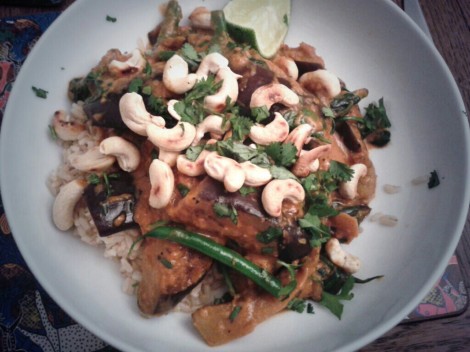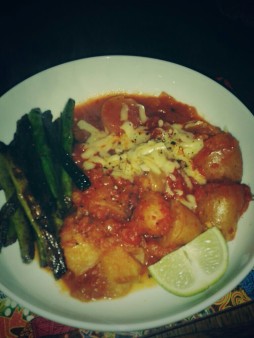I’m delighted to introduce this fantastic guest post from Sophia Komninou who has some really good advice on the importance of eating well for your mental and physical health throughout your PhD. Remember to show Sophia some love on twitter @SophiaKomninou! I’m particularly delighted about this post because I finally have use for all of the pictures I take of my dinner! Hooray! Hope this post doesn’t make you too hungry!
As I trained as a nutritionist I started to understand the impact of what we are eating in our well being, physically and mentally. The PhD is a stressful job. It is mentally demanding. Well, you all knew that. What I have gathered for you today is some tips and advice on how to eat healthier while doing your PhD. The aim of this is to be both motivational and informative but I realized if I make it too informative it would be even longer than it is. So I hope it is more motivational enough to look up for some more information.
Eat better for better physical health: By eating a healthy, balanced diet you will make you will improve your physical health. Your immune system will have all it needs to fight colds and flues. This will mean you will need less time off when you don’t want to take time off and possibly more time off for holidays and vacations. Time off because you are sick means you will only worry about your experiments and progress while you are suffering on your bed. On the other hand if you are healthy most of the time you can get a few more times off for relaxation and avoid being extra stressed the rest of the year. It is a win win situation really!
Small goals are always the key: Those are lifelong habits and they need to be introduced slowly. Keeping your weight stable is essential. Try to weight yourself every now and then. Losing weight is equally dangerous as gaining weight at this stage. If you feel like you should be losing weight avoid radical diets like the plague. They usually exclude one or more food groups and we need them all to function at our maximum level! If you have a weight problem, you might want to talk to your GP and refer you to a qualified dietician who will structure and quantify your meals so you can lose weight healthy! Consider taking up a hobby. Stress releasing activities will help you both physically and mentally.
Start with a good breakfast: Probably you wake up and you think the hundreds of things you have to do today in the lab, the deadline of the paper, the ethics application for the next study. So you get out of the bed, you brush your teeth, wear your clothes and march to the office. On your way there you stop to the nearest coffee shop and you grab a coffee. Well, STOP! Slow down. Wake up just 10 minutes earlier, I know, it is difficult. Prepare a good breakfast. Avoid high sugar, refine starch. This can cause inflammatory reactions to your body and cause more internal stress. Go for whole meal fibrous cereal, semi skimmed milk, a bowl of porridge with a handful of dried fruit, a couple toasts with some low fat cheese or an egg, and a yogurt with fresh fruit. You get my point? Healthy, balanced stuff. Include carbs, protein and fat, never exclude any of these for any reason!
Avoid coffee and stimulants: I know you are probably addicted to caffeine but try to reduce it. Caffeine makes you more alert, yes, but also makes you body increase the cortizol levels in your blood stream and make you nervous, stressed and hyper. This sounds exhausting to me. Stay away from energy drinks. Apart from caffeine they contain simple sugars and many chemicals you don’t really want to put in your body. Try tea, which has half or less of a latte’s caffeine content or herbal tea which doesn’t include caffeine at all. Remember green tea is not considered herbal tea (if you are planning to completely give up caffeinated drinks) and has caffeine too (although much less). If you like coffee taste (like me) go for decaf or ask for less shots of espresso if you feel less hard core. Please, please don’t try going cold turkey. It will only cause more stress to your body.
Lunch time: Let’s put first things first. Cookies are not lunch. No matter how many you eat. You might feel less hungry but you didn’t take the nutrients you need to get through the day. No, not even when they are free leftovers from the morning lab meeting. You need balanced meals. Remember? Carbs, proteins, fat. And variety! By the end of my first year I decided that if I had to have one more Tesco’s sandwich for lunch I would start crying. I had most of the varieties more than one time and it started getting boring. Plus, when I calculated the cost of getting a sandwich or eat at the student restaurant the amount was quite big. Instead I decided to cook. Not only I saved a fortune and I could choose the ingredients I put in my food according to my taste, but I also found cooking amazingly therapeutic and relaxing. Use as many vegetables and colours as you can. Start with simple recipes if you have never cooked before. If you already have your lunch packed in the office fridge you will be less tempted to go towards those leftover cookies and sandwiches. Last but not least. Savour your food. You might argue you don’t have time to eat and that is why you eat on your desk. I do that too, but find some fellow PhD students and have a lunch club at least once or twice a week. It will give you all some time for social interaction, time to listen to each other and maybe help with any problems they may face. No matter how busy you are NEVER SKIP MEALS!
Snacks in coffee breaks: Again, plan ahead. You may find yourself eating those chocolate bars (or the cookies leftovers you avoided during lunch) with your afternoon (herbal) tea (you are trying to cut down on caffeine here, remember?). Be prepared. Have some nuts always in your drawer. Don’t over eat them. A handful is enough as they are very rich in calories. Make some oat and raisin cookies on the weekend and have one or two as a snack. Fruits are always great! Try fresh, but even if you are not a fan dried are a good alternative. Again, on the dried fruits it is easy to overeat as they are much smaller than fresh so keep in mind you only need a handful.
Drink water throughout the day: Dehydration can make you irritated, cause headaches impair your thinking process. If you start being thirsty it means you already are dehydrated. Not very good stuff if you already live a stressful life. Keep a bottle of water on your desk at all times. This will remind you drink your fluids. Avoid sugared drinks, juice, carbonated drinks etc. Just drink water.
Reduce salt: Salt increases your blood pressure. The same as stress does. Try using less and less salt in your food. Start by avoiding adding it on your plate and then when you are cooking. You will be surprised to find at the end that you don’t really need it to add taste to your food. Avoiding readymade meals and takeaways will help too. They are full of salt to be tastier. Try to cook your own food. Remember? You can check exactly what goes in. Salt included. Experiment with herbs and spices to add flavour! They are full of good stuff too!
Dinner time: I am going to say it once more. Try to cook your meals. I cook larger quantities and I usually have food for 2-3 days when I cook so I don’t even need to do that every day. The amount of effort and time to make a few more portions is minimum and you get lunch and dinner for the day after (and your evening free to do whatever makes you happy). Include a source of protein every time. It doesn’t have to be meat. Oily fish (like salmon) is particularly good. It is expensive but try to eat it once a week. Cheese is another protein source but you need to be careful with the fat content. Plant based protein sources include legumes (lentils, beans, chick peas), quinoa, soya beans and tofu. Finally, I cannot stress enough how important carbs are in your life! Go for brown alternatives of pasta, rice etc. Try couscous and bulgur. But don’t exclude them for ANY reason from your diet. You will notice headaches, mood swings and sleep problems. You don’t want this. Not while you are dealing with your PhD not ever in your life!
Plan your meals and make a shopping list: This is essential to stay in budget. Think about how much you are going to eat for the week and make a big shopping trip to the supermarket instead of daily small trips if possible. This will save you time too, especially if it is not on your way home. Make a list and stick to it. Occasionally you may decide to buy something instead of something else because it is on offer or because you feel like they are a good idea. Do that carefully. Try to switch things on offer with the same kind of things on your list comparing the offer price with the initial price of the product on the list. (i.e. fruits with fruits, veggies with veggies, yogurt for yogurt, you get the point). This way you will not go over your budget and you will not buy more stuff than you need. Bulk buy only things that you know that you will definitely use, otherwise it is just a waste! Try farmer’s markets for more fresh produce and smaller prices. There are also some veggie box services out there. They are usually organic, seasonal and fresh produce and you can find local farms or more national companies that they can deliver right to your door. Some of them also have meat, eggs, milk etc. I found that it actually saved me money and I cooked more, eating less junk food. They usually come with recipes which use the exact contents of the box which is very handy! I am doing much less trips to the supermarket too (which translates to fewer temptations).
I hope those little tips will help you go through your PhD and beyond. Please, please take care of yourselves. PhD is important but your physical and mental health is more important! Without them you cannot keep going and you will continuously make everything more challenging in your everyday life. Stay healthy and happy!






